Constipation
Constipation medication is formulated to relieve infrequent bowel movements or difficulty passing stools, common symptoms of constipation. This category encompasses various types of laxatives, including bulk-forming agents which increase stool bulk, stimulant laxatives that speed up bowel movements, osmotic agents that help fluids move through the colon, and stool softeners. Read More…

-

Glycerol (Glycerin) Suppositories – 12 Pack
- Fast & Effective Relief From Constipation
- Buy With Confidence From UK Registered Pharmacy
- Next Day Delivery Available
£3.49 – £3.99 Select options This product has multiple variants. The options may be chosen on the product page -
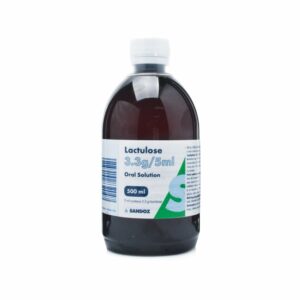
Lactulose Oral Solution 500ml
- Relieves Constipation
- Active Ingredient: Lactulose
- Maintains Regularity Of Bowel Movements
-

Manevac Granules – 250g
- Reduces pain when emptying the bowels
- Maintains regular bowel action in pregnant women
- Effective relief from constipation
-
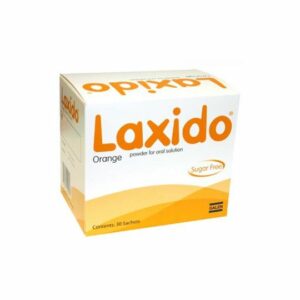
Laxido Orange Sugar-Free Sachets
- Contains Macrogol 3350
- Relief From Constipation
- Registered UK Pharmacy
£7.99 – £10.99 Select options This product has multiple variants. The options may be chosen on the product page -

Liquid Paraffin 150ml
- Aids The Passing Of Stools
- Suitable For Children Ages 3 And Over
- Effective Relief From Constipation
-

Cleen Ready To Use Enema 133ml
- Used For Bowel Cleansing Prior To Medical Exams
- Easy To Use
- Effective Relief From Constipation
-
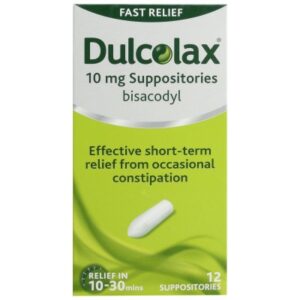
Dulcolax 10mg Suppositories – 12 Suppositories
- Active Ingredient: Bisacodyl
- Effective Constipation Treatment
- Next Day Delivery Available
-
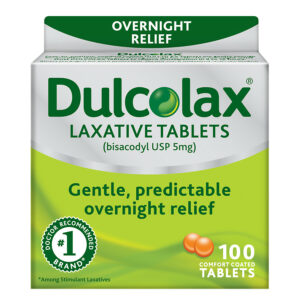
Dulcolax Laxative Tablets (5mg)
- Effective Constipation Relief
- Active Ingredient : Bisacodyl
- Next Day Delivery Available
£2.99 – £9.99 Select options This product has multiple variants. The options may be chosen on the product page -
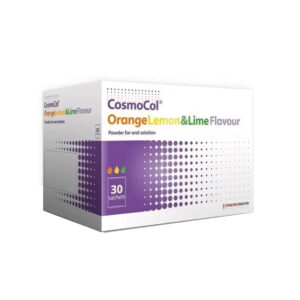
CosmoCol Sachets – 30 Sachets
- Effective relief from constipation
- Powder for oral solution
- Active Ingredient: Macrogol 3350
£9.99 – £10.99 Select options This product has multiple variants. The options may be chosen on the product page -

Senokot Max Strength Tablets
- Relieves Constipation
- Clinically Proven Medicine
- Next Day Delivery Available
£3.99 – £10.99 Select options This product has multiple variants. The options may be chosen on the product page -
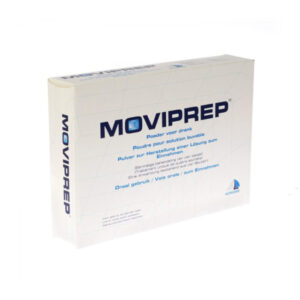
Moviprep Sachets Original – 4 Sachets
- Lemon flavoured laxative contained in four sachets
- Empties the contents of the bowel
- Typically used before a bowel examination
-
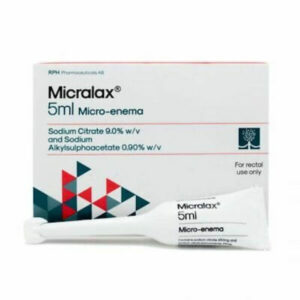
Micralax 5ml Micro-Enema – 12 Tubes
- Effective Constipation Relief
- Active Ingredient: Sodium citrate / Sodium lkylsulfoacetate
- For Short-Term Use Only
-
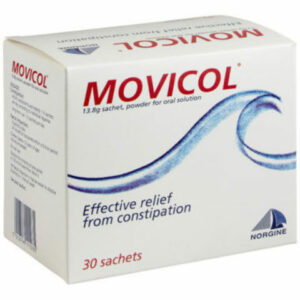
Movicol 30 x 13.8g Sachets – Lemon & Lime Flavour
- Active Ingredient: Macrogol
- Effective Constipation Relief
- Buy With Confidence From UK Resgistered Pharmacy
-

Fybogel Hi-Fibre Sachets
- Gently Relieves Constipation
- Active Ingredient: Ispaghula Husk
- Maintains Regularity Of Bowel Movements
£5.99 – £14.99 Select options This product has multiple variants. The options may be chosen on the product page -

Lecicarbon A Suppositories – 10 Suppositories
- Relieves Muscle Spasms
- Targets Source Of Abdominal Pain
- Effective Relief From Cramps And Flatulence
-
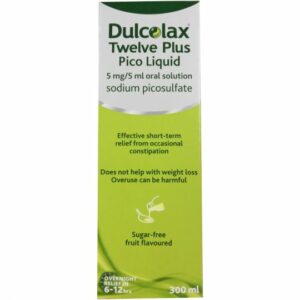
Dulcolax Twelve Plus Pico Liquid 5mg/5ml – 300ml
- Effective Constipation Relief
- Active Ingredient : Sodium Picosulfate
- Buy With Confidence From UK Registered Pharmacy
-

Dioctyl (Docusate) 100mg Capsules – 30 Capsules
- Relieves Constipation
- Active Ingredient: Docusate Sodium
- Maintains Regularity Of Bowel Movements
-
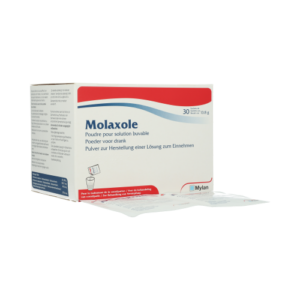
Molaxole 13.8g sachet, powder for oral solution – 30 Sachets
- Macrogol 3350
- Powder for oral solution
- For the relief of constipation
-
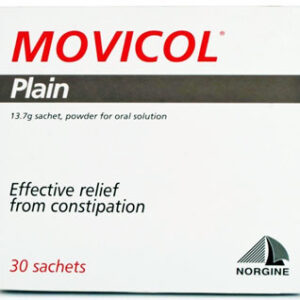
Movicol Plain 30 x 13.7g Sachets, Powder For Oral Solution
- Active Ingredient: Macrogol
- Effective Constipation Relief
- Buy With Confidence From UK Resgistered Pharmacy
-
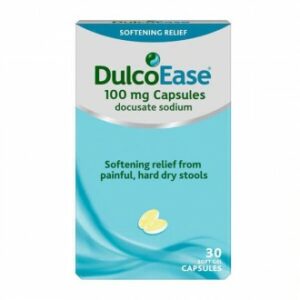
DulcoEase 100mg – 30 Capsules
- Works with the body to provide gentle and effective relief of constipation
- The UK’s #1 effective constipation relief range
- Buy With Confidence From UK Registered Pharmacy
-
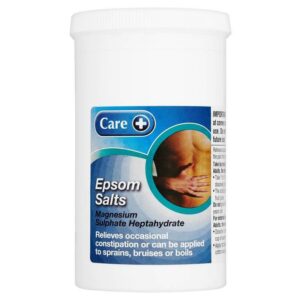
Epsom Salts 300g
- Active Ingredients: Magnesium Sulfate
- Effective Relief From Constipation
- Buy With Confidence From UK Registered Pharmacy
-
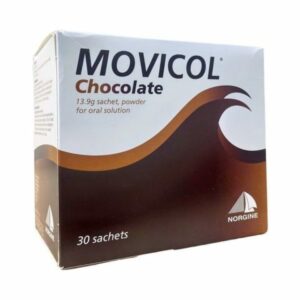
Movicol Chocolate 30 x 13.9g Sachets Powder For Oral Solution
- For the relief of constipation
- Can be used to relieve faecal impaction
- Chocolate flavour
-
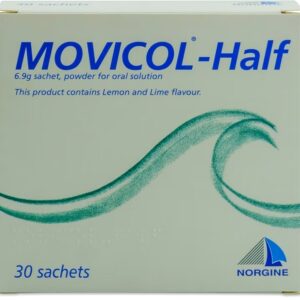
Movicol-Half Sachets – 30 Sachets
- Powder for oral solution
- For the treatment of constipation in adults, adolescents and children
- Can also be used to treat faecal impaction
-

Care Senna 7.5mg Adult – 20 Tablets
- Herbal medicine used for the short term relief of occasional constipation
- Does not help with weight loss
- Overuse can be harmful
-

Senokot Syrup 12+ Years 7.5mg/5ml – 150ml
- Reduces Pain When Emptying The Bowels
- Maintains Regular Bowel Action
- Effective Relief From Constipation
-
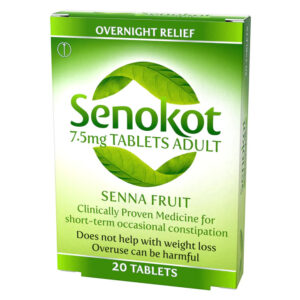
Senokot 7.5mg Adult Tablets
- Effective laxatives which contain natural senna
- Clinically proven medicine for short-term, occasional constipation
- Available in sizes of 20 & 60!
£4.99 – £8.99 Select options This product has multiple variants. The options may be chosen on the product page -
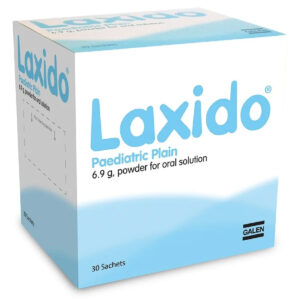
Laxido Paediatric Plain Sachets – 30 Sachets
- Contains Macrogol 3350
- Provides relief from chronic constipation for children aged 1 to 11 years
- Can also be used to treat a build up of hard faeces in the bowel
-
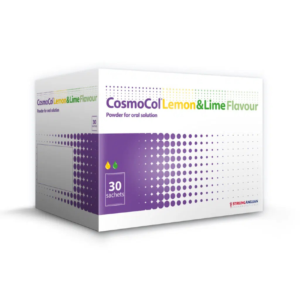
CosmoCol Lemon & Lime Flavour – 30 Sachets
- Lemon and lime flavour
- Treatment for long-term constipation and faecal impaction
- Contains Mavrogol 3350
-
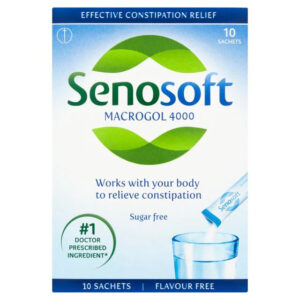
Senosoft Constipation Sachets
- Sugar- Free
- Effective Constipation Relief
- Active Ingredient : Macrogol
£10.99 – £16.49 Select options This product has multiple variants. The options may be chosen on the product page -
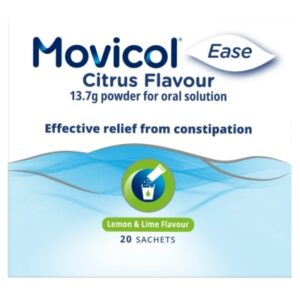
Movicol Ease Citrus Flavour Sachets – 20 Sachets
- Provides gentle relief of constipation
- Citrus flavour
- Easy to take
-

Fybogel Fibre Chews
- Citrus flavoured chewable tablets
- Helps relieve constipation and maintain regularity
- Uses the ingredient Fibersol -2 (a type of fibre)
£10.99 – £17.49 Select options This product has multiple variants. The options may be chosen on the product page -
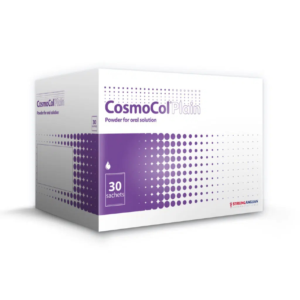
CosmoCol Plain – 30 Sachets
- Plain flavour
- Treatment for long-term constipation and faecal impaction
- Contains Mavrogol 3350
-
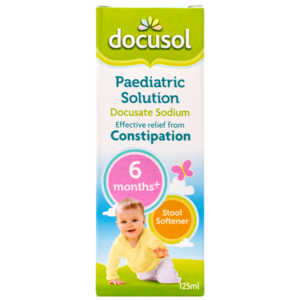
Docusol Paediatric Solution 125ml
- Relieves Constipation
- Active Ingredient: Docusate Sodium
- Maintains Regularity Of Bowel Movements
-

FyboCalm Constipation Relief Capsules – 30 Capsules
- Helps relieve and prevent your IBS related constipation symptoms recurring
- Long lasting relief for recurrent constipation due to IBS
- Gutshield Technology
-

Lecicarbon C Suppositories – 10 Suppositories
- Treats Symptoms Of Chronic Constipation
- Targets Source Of Abdominal Pain
- Effective Relief From Cramps And Flatulence
-
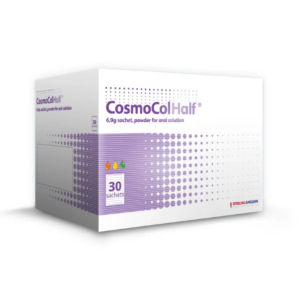
CosmoCol Half Sachets – 30 Sachets
- Used by adults, adolescents and the elderly
- Treatment for long-term constipation and faecal impaction
- Contains Mavrogol 3350
-

Normacol Constipation Relief Sachets 7g – 60 Sachets
- Active Ingredient: Sterculia
- Suitable For Children Ages 6 And Over
- Effective Relief From Constipation
-
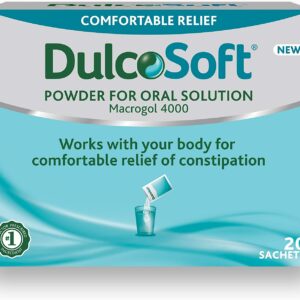
Dulcosoft Powder Sachets – 20 Sachets
- Can Be Mixed Into Hot Or Cold Drinks
- Suitable For Children Ages 8 And Over
- Effective Relief From Constipation
-
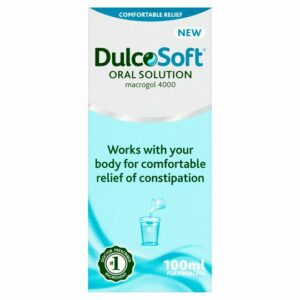
Dulcosoft Liquid 100ml
- Effective Constipation Relief
- Active Ingredient : Macrogol
- Buy With Confidence From UK Registered Pharmacy
-

Moviprep Orange Sachets – 4 Sachets
- Orange flavoured laxative contained in four sachets
- Empties the contents of the bowel
- Typically used before a bowel examination
-
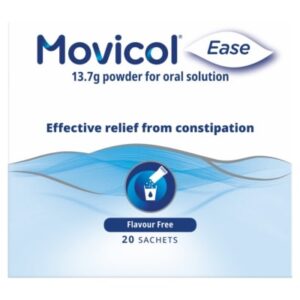
Movicol Ease Flavour Free Sachets – 20 Sachets
- Provides gentle relief of constipation
- Easy to take
- Gluten and lactose free
-
About Constipation Medications
Over-the-counter (OTC) constipation medications, known as laxatives, are formulated to relieve symptoms of constipation and help facilitate bowel movements. These medications come in various types, each working differently to address constipation:
Oral Osmotics: They work by drawing water into the colon to ease the passage of stool, and are helpful for individuals experiencing occasional constipation. However, they may cause bloating, cramping, or diarrhoea if not taken as directed.
Bulk-forming Agents: These fibre supplements absorb water to form soft, bulky stools, which can trigger the bowel to push the stools out. Taking enough water with these supplements is essential to prevent further constipation.
Stool Softeners: Adding moisture to the stool allows for easier and strain-free bowel movements but should be used with caution over long periods to avoid electrolyte imbalances.
Stimulant Laxatives: They induce rhythmic contractions in the colon muscles, propelling the stool forward. While effective, they might lead to side effects such as cramping or diarrhoea.
Lubricant Laxatives: Products like mineral oil can help stool move more smoothly through the colon but should be used sparingly to avoid nutrient malabsorption.It’s crucial to note that laxatives should be taken according to the instructions on the label and not used for more than a week unless recommended by a healthcare provider. Prolonged or excessive use can lead to dependency, decreased bowel function, and interference with absorption of nutrients and medication. Some individuals, especially those with certain health conditions, should consult their doctors before taking OTC laxatives to avoid complications like electrolyte imbalances or interactions with other medications.
-
Symptoms
Certainly, here are the symptoms of constipation summarised in bullet points:
• Fewer than three bowel movements per week
• Stools that are hard, dry, or lumpy
• Stools that are difficult or painful to pass
• A feeling of incomplete evacuation after a bowel movement
• A sensation of blockage in the rectum
• The need for manual efforts to pass stool in some cases
• Interference with daily activities due to symptoms
• Rectal bleeding or blood in the stool
• Unexplained weight loss
• Continuous abdominal painThese symptoms can result from a variety of causes, including dietary habits, medications, health conditions, and lifestyle changes.
-
Diagnosis
Diagnosing constipation involves a combination of approaches, starting with a review of your medical and family history, a physical examination, and potentially some medical tests if required.
During the initial consultation, your healthcare provider will ask about your digestive tract history, any recent weight changes, and your family’s medical history, especially concerning digestive tract disorders or colon cancer. Questions about your bowel movement frequency, stool characteristics, diet, fluid intake, and physical activity levels are also typical. Keeping a diary of your bowel movements and noting any accompanying symptoms such as blood in the stool can be very useful for your doctor.
A physical examination usually follows, where a healthcare provider may check your blood pressure, temperature, heart rate, and listen to sounds in your abdomen. They may also feel your abdomen for tenderness, swelling, or masses and perform a rectal exam to detect any anomalies.
Lab tests such as blood and urine tests can be requested to identify underlying conditions like hypothyroidism, anaemia, and diabetes. In some cases, stool tests may be conducted to check for infection, inflammation, and cancer indicators.
If more information is needed, your doctor may use imaging tests like a computed tomography (CT) scan, magnetic resonance imaging (MRI), or gastrointestinal tract series to identify problems causing constipation. Colonoscopy or sigmoidoscopy may also be performed to examine the inside of your colon and rectum.
Additional functional tests to examine bowel movement and colon transit include colorectal transit studies, which can involve swallowing a capsule with markers to track stool movement through the colon, or eating a meal with a small dose of a radioactive substance to observe its passage through the intestines.
If problems with pelvic floor muscles are suspected, tests such as defecography, anorectal manometry, and the balloon expulsion test can help assess the muscles’ function related to bowel movements.
The diagnostic process is thorough and aims to identify not just the symptoms of constipation but also the underlying causes, ensuring that the treatment plan is tailored to your specific needs. If you experience symptoms of constipation, especially if they’re new or have changed, it’s essential to discuss them with your healthcare provider to receive proper evaluation and management.
-
Treatment
Over-the-counter (OTC) constipation medications can be a convenient and effective way to alleviate symptoms of constipation. These products typically work by different mechanisms to either soften the stool, increase stool bulk, or stimulate bowel movements. Here’s some highlighted products that we offer:
- Glycerol (Glycerin) Suppositories: These suppositories work by irritating the lining of the intestine and increasing the water content in the stool, resulting in a laxative effect. This can provide fast relief from constipation, often working within minutes to an hour.
- Lactulose Oral Solution: This is an osmotic laxative that works by drawing water into the bowel to soften stools and increase bowel activity. It’s often used for treating chronic constipation and can be particularly useful in maintaining regular bowel movements.
- Manevac Granules: Containing a blend of fibres, these granules work as a bulk-forming laxative, which increases stool bulk and triggers the bowel to push the stools out. It’s often recommended for individuals who need to maintain regular bowel action, including pregnant women.
- Laxido Orange Sugar-Free Sachets: These contain Macrogol 3350, which is another type of osmotic laxative. It works by retaining water in the stool, softening it and making it easier to pass, and is especially helpful for those with chronic constipation.
These medications should be used as part of a regimen that includes dietary changes, increased fluid intake, and regular exercise for best results. If you’re considering an OTC laxative for constipation relief, it’s also crucial to consider any possible interactions with other medications you may be taking and to be aware of any underlying health conditions that may be affected by laxative use.
-
Prevention Strategies
Preventing constipation is often possible with lifestyle and dietary changes. Here are several steps to help prevent this condition:
• Increase Fibre Intake: Incorporating a variety of fibre-rich foods, such as fruits, vegetables, and whole grains, can help improve bowel function. Gradually adding fibre to your diet can help avoid bloating and gas.
• Stay Hydrated: Drinking plenty of water each day is essential. Aim for at least eight glasses of water, and limit caffeine as it can dehydrate you.
• Regular Exercise: Physical activity can help keep stool moving through the colon, so try to include regular exercise in your routine.
• Respond to Bowel Urges: When you feel the urge to go, don’t delay. Waiting can make stools harder and more difficult to pass.
• Establish a Routine: Try to create a regular schedule for bowel movements, especially after meals.
• Limit Low-Fiber Foods: Eating fewer foods with low amounts of fibre, such as processed foods, dairy, and meats, can help prevent constipation.If these self-care steps don’t resolve your constipation, or if you experience any severe symptoms like rectal bleeding, abdominal pain, or unexpected weight loss, it’s important to see a doctor. They can help identify any underlying conditions and recommend appropriate treatments.












